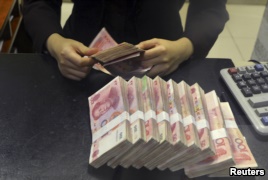
Zimbabwe announced last week that it would shift to the Chinese yuan as its reserve currency.
A reserve currency is a foreign currency held in large quantities by governments and financial institutions to pay international debts.
"Reserve currency is held in order to support the value of national currencies," writes Justin Kuepper, international investing expert, on the website International Invest.
Patrick Chinamasa is Zimbabwe's Minister of Finance and Economic Development. He said China agreed to cancel about $40 million of Zimbabwe's debts this year.
He also said the move was a sign of the friendship between China and Zimbabwe, a poor country in southern Africa.
It is also a sign of the growing economic ties between China and Zimbabwe. China is Zimbabwe's largest foreign investor, with interests ranging from construction and energy to telecommunications.
China has also become the largest exporter of Zimbabwean products – mainly tobacco and minerals, such as gold and diamonds.
Local economists said Zimbabwe is flooded with foreign currencies since the inflated Zimbabwean dollar collapsed in 2009.
In 2014, the nation's central bank permitted traders to use the U.S. dollar, the South African rand, Botswana's pula, the British pound, the euro, the Australian dollar, the Indian rupee, the Japanese yen and the Chinese yuan.
Business consultant Phillip Chiconi says this announcement is unlikely to change things for the businessmen with whom he works.
"I don't think it will make much difference to anyone, as we're already using foreign currencies," he said.
Zimbabwe has allowed the yuan as a legal currency for two years. But Chiconi said he has not seen it used. Instead, most traders prefer the stability of the U.S. dollar, which is being used as the country's major currency.
Zimbabwe suffered economic collapse after years of government mismanagement. That caused the Zimbabwean dollar to inflate above 230 million percent.
Although the central bank printed a 100-trillion-dollar bill, it didn't buy much. A loaf of bread cost $300 billion. The currency was done away with in 2009.
The market has stabilized by the U.S. dollar. But Zimbabwe's cost of living is still about 60 percent higher than that of neighboring South Africa.
BancABC chief economist James Wade says the yuan increases Zimbabwe's options.
"It's not like we're forcing people to use the Chinese yuan," he said. "... we are expanding options that they can use."
And, he notes, the context matters. China's president made a state visit to Zimbabwe this month, and signed many economic agreements. This included a billion-dollar loan for a thermal power plant.
If this action brings in more Chinese investment and more development, Zimbabweans will profit, no matter what currency they use.
I'm Mary Gotschall.











